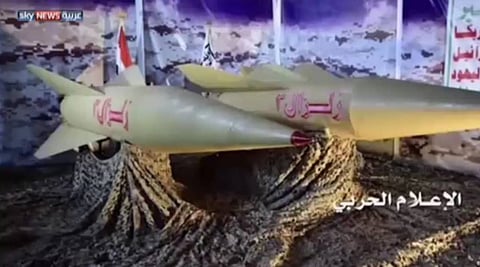Al Houthis display new Iranian-designed missiles
Military experts cast doubt over claims they are locally made

Dubai: The Iran-backed Al Houthi militia that occupied the Yemeni capital has displayed new, “locally-designed” missiles believed to have Iranian specifications, according to media reports.
Sky News Arabia cited military experts casting doubt over Al Houthi claims of local design, saying that they are likely to be Iranian imports.
The coalition fighting to restore the internationally-recognised government of Yemeni President Abd Rabbo Mansour Hadi accuses Iran of supplying Al Houthis with weapons.
Military experts told Sky News that the building of such weapons in Yemen requires advanced technology which Al Houthis and their ally, ousted President Ali Abdullah Saleh, do not possess.
The experts said that only two regimes, Iran and Syria, as well as Iran-backed Lebanese militia Hezbollah, are known to own such missiles.
The new missile has been names Zelzal 3 (Earthquake 3).
On Monday, UAE Foreign Minister Shaikh Abdullah Bin Zayed Al Nahyan said his country was committed to continue its support of Yemen’s internationally recognised government.
Shaikh Abdullah said after talks with his Cypriot counterpart on Monday that the UAE is also “very much committed” to pursuing Al Qaida in Yemen where the group has taken root because of a lack of government control.
Delegations representing the Al Houthi-Saleh alliance and those representing the Hadi government have been conducting negotiations to bring an end to the war there.
On Sunday, Hadi threatened to boycott peace talks with the rebels if the UN envoy insists on a road map stipulating a unity government that includes the insurgents.
The UN-sponsored talks are scheduled to resume on Friday in Kuwait after a two-week break.
More than two months of negotiations have failed to make headway to end the deadly conflict.
“We will not return to the talks in Kuwait if the United Nations tries to impose the latest proposal by mediator Esmail Ould Shaikh Ahmad,” Hadi said during a visit to inspect troops in Marib province, east of the rebel-held capital.
Ould Shaikh Ahmad has put forward a peace road map that would see the formation of a unity government and the withdrawal and disarmament of the rebels.
He said the negotiators had welcomed his proposal but had not agreed a timetable or the steps needed to implement it.
The government had already expressed doubts this month about the UN-backed efforts.
Hadi’s government wants to re-establish its authority across the entire country, much of which is rebel-controlled, and restart a political transition interrupted when Al Houthis seized Sana’a in 2014.
The rebels have conditioned their withdrawal on both sides agreeing on a new president to manage the transition.
In his speech, published on the official sabanew.net website, Hadi insisted that the rebels were using the Kuwait talks to “legitimise their coup d’etat”, and rejected the UN proposal for a unity government.
— with inputs from AFP
Sign up for the Daily Briefing
Get the latest news and updates straight to your inbox



